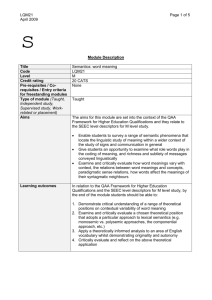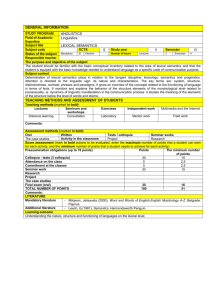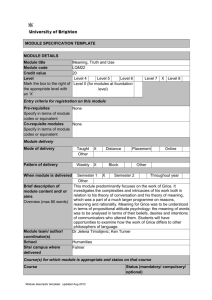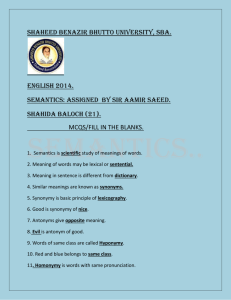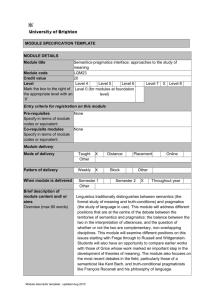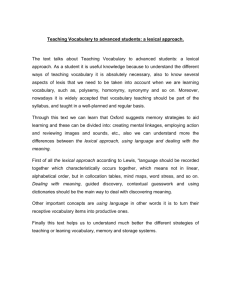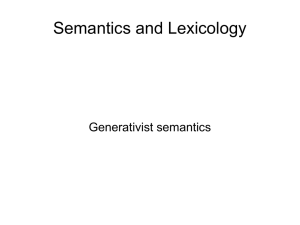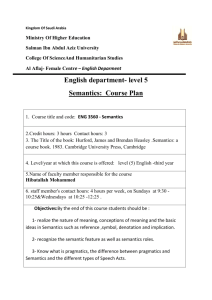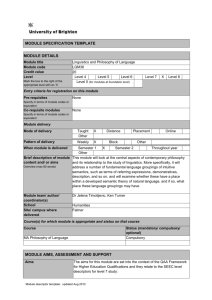LQM21_Word meaning and speaker meaning_2014_v2
advertisement
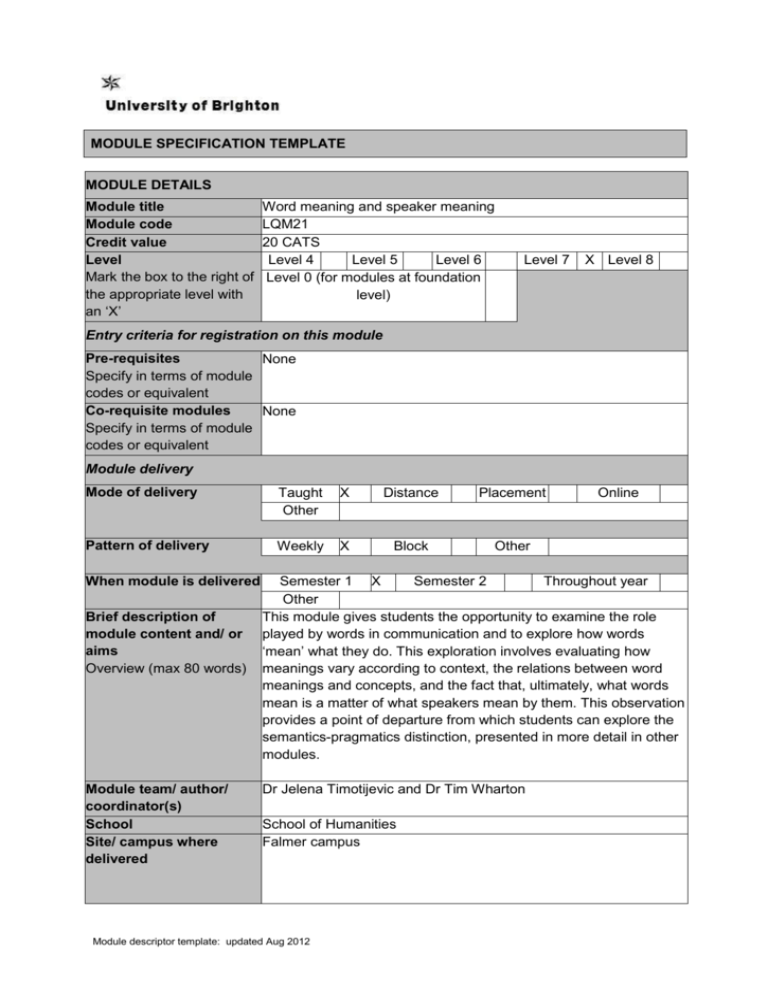
MODULE SPECIFICATION TEMPLATE MODULE DETAILS Module title Module code Credit value Level Mark the box to the right of the appropriate level with an ‘X’ Word meaning and speaker meaning LQM21 20 CATS Level 4 Level 5 Level 6 Level 0 (for modules at foundation level) Level 7 X Level 8 Entry criteria for registration on this module Pre-requisites None Specify in terms of module codes or equivalent Co-requisite modules None Specify in terms of module codes or equivalent Module delivery Mode of delivery Taught Other X Distance Placement Pattern of delivery Weekly X Block Other When module is delivered Brief description of module content and/ or aims Overview (max 80 words) Module team/ author/ coordinator(s) School Site/ campus where delivered Online Semester 1 X Semester 2 Throughout year Other This module gives students the opportunity to examine the role played by words in communication and to explore how words ‘mean’ what they do. This exploration involves evaluating how meanings vary according to context, the relations between word meanings and concepts, and the fact that, ultimately, what words mean is a matter of what speakers mean by them. This observation provides a point of departure from which students can explore the semantics-pragmatics distinction, presented in more detail in other modules. Dr Jelena Timotijevic and Dr Tim Wharton School of Humanities Falmer campus Module descriptor template: updated Aug 2012 Course(s) for which module is appropriate and status on that course Course Status (mandatory/ compulsory/ optional) Compulsory Compulsory Optional Optional MA Linguistics MA English language MA Philosophy of Language MRes Linguistics MODULE AIMS, ASSESSMENT AND SUPPORT Aims The aims for this module are set into the context of the QAA Framework for Higher Education Qualifications and they relate to the SEEC level descriptors for M level study. Learning outcomes Enable students to survey a range of semantic and pragmatic phenomena in the study of meaning Give students an opportunity to examine the role words play in the communication of meaning, and semantic and pragmatic accounts of the richness and subtlety of messages the convey Examine and critically evaluate how word meanings vary with context, the relations between word meanings and concepts and paradigmatic sense relations In relation to the QAA Framework for Higher Education Qualifications and the SEEC level descriptors for level M study, by the end of the module students should be able to: 1. Demonstrate critical understanding of a range of theoretical positions on contextual variability of word meaning 2. Examine and critically evaluate a chosen theoretical position that adopts a particular approach to lexical semantics or lexical pragmatics 3. Examine and critically evaluate a chosen theoretical position that adopts a particular approach to the nature of concepts (prototype theory, componential analysis) 4. Apply a theoretically informed analysis to lexical semantics, lexical pragmatics or conceptual structure whilst demonstrating originality and autonomy 5. Critically evaluate and reflect on the above theoretical application Content Learning support Monosemy, polysemy and homonymy Contextual variability: word meaning and speaker meaning Lexical semantics and lexical pragmatics Paradigmatic sense relation Figurative language Books: Austin, J. L. (1962) How to do things with words. Oxford: Oxford Module descriptor template: updated Aug 2012 University Press Cruse, A. (1994) “Prototype theory and lexical relations”, Rivista di Linguistica 6.2, 167-188. Cruse, A. (2000) Meaning in Language. An Introduction to Semantics and Pragmatics. Oxford: Oxford University Press. Goddard, C. (1998) Semantic Analysis. A Practical Introduction. Oxford: Oxford University Press. Lyons, J. (1977) Semantics. Cambridge: Cambridge University Press. Lyons, J. (1995) Linguistic Semantics. Cambridge: Cambridge University Press. Preyer, G. &. G. Peter (eds.), (2007) Context-sensitivity and semantic minimalism. Oxford: Oxford University Press. Ruhl, C. (1989) On Monosemy. A study of linguistic semantics. Albany: State University of New York Press. Saeed, J. (2008) Semantics. 3rd Edn. Oxford: Blackwell. Wierzbicka, A. (1996) Semantics: Primes and Universals. Oxford: Oxford University Press. Journals: Journal of Linguistics Journal of Semantics Journal of Pragmatics Electronic Sources: Semantics Archive http://semanticsarchive.net/ Wordnet: a lexical database for the English language http://wordnet.princeton.edu/ Framenet: an on-line lexical resource for English, based on frame semantics http://framenet.icsi.berkeley.edu/ Teaching and learning activities Details of teaching and learning activities Contact Time: Lectures, workshops and tutorials Module descriptor template: updated Aug 2012 Non-contact Time: Directed reading Studentcentral Allocation of study hours (indicative) Where 10 credits = 100 learning hours Study hours SCHEDULED This is an indication of the number of hours students can expect to spend in scheduled teaching activities including lectures, seminars, tutorials, project supervision, demonstrations, practical classes and workshops, supervised time in workshops/ studios, fieldwork, external visits, and work-based learning. 20 GUIDED INDEPENDENT STUDY All students are expected to undertake guided independent study which includes wider reading/ practice, follow-up work, the completion of assessment tasks, and revisions. 180 PLACEMENT The placement is a specific type of learning away from the University that is not work-based learning or a year abroad. TOTAL STUDY HOURS 200 Assessment tasks Details of assessment for this module General criteria for assessment are framed by the SEEC descriptors for M level. Against specific criteria, credit will be awarded for: 1. Critical understanding of a range of theoretical positions on contextual variability of word meaning (LO1) 2. Critical evaluation and examination of a chosen theoretical position that adopts a particular approach to lexical semantics or lexical pragmatics (LO2) 3. Ability to critically evaluate a chosen theoretical position that adopts a particular approach to the nature of concepts (prototype theory, componential analysis) (LO3) 4. Successful, original and autonomous application of a chosen theoretical approach to an area of English vocabulary (LO4) 5. Critical evaluation and reflection on the above theoretical application (LO5) All learning outcomes must be achieved in order to pass the module at the threshold level. Module descriptor template: updated Aug 2012 Types of assessment task1 Indicative list of summative assessment tasks which lead to the award of credit or which are required for progression. WRITTEN Written exam COURSEWORK Written assignment/ essay, report, dissertation, portfolio, project output, set exercise PRACTICAL Oral assessment and presentation, practical skills assessment, set exercise % weighting (or indicate if component is pass/fail) 100% EXAMINATION INFORMATION Area examination board PG Programme in Linguistics and English language Refer to Faculty Office for guidance in completing the following sections External examiners Name Position and institution Date appointed Date tenure ends Prof. Daniel Kadar Professor of Linguistics and English language, Uni. of Huddersfield 1st Jan. 2015 31st Dec. 2019 QUALITY ASSURANCE Date of first approval Only complete where this is not the first version 2009 Date of last revision Only complete where this is not the first version 2009 Date of approval for this version Version number 2 Modules replaced n/a 1 Set exercises, which assess the application of knowledge or analytical, problem-solving or evaluative skills, are included under the type of assessment most appropriate to the particular task. Module descriptor template: updated Aug 2012 Specify codes of modules for which this is a replacement Available as free-standing module? Module descriptor template: updated Aug 2012 Yes X No
